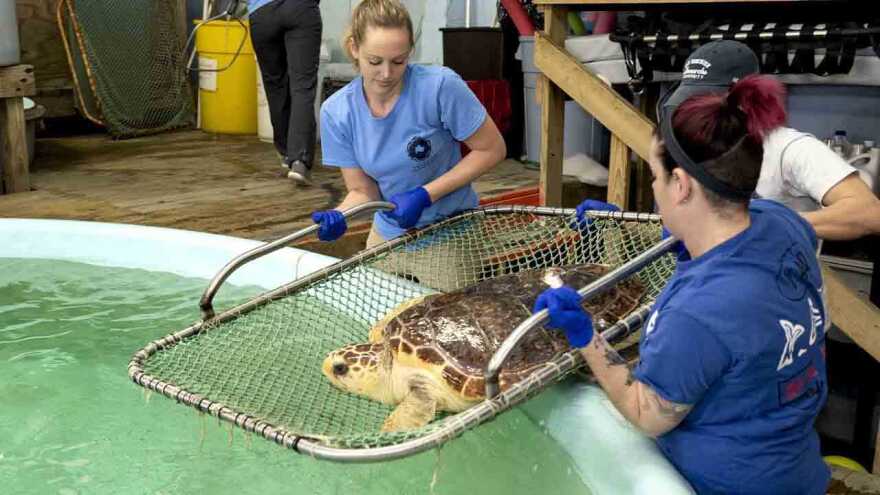It’s a typical day for Dr. Allyson McNaughton, the veterinarian who cares for sick and injured creatures at the Darden Marine Animal Conservation Center in Virginia Beach.
Manager Erin Bates is holding a large Kemps-Ridley turtle that required surgery after swallowing a fishing hook. Fortunately, the patient is calm as McNaughton checks its incision.
“They do have nails on those flippers, so they can injure us with the flapping of their flippers," she explains. "heir beaks and their mouths are very, very strong. These animals eat shelled food, so they have a very strong bite,”
But mostly it’s the turtles that are injured by boat propellers and fishing hooks in the Chesapeake Bay.
Bates oversees seven large rehab tanks where most of the animals live while recovering. They began arriving last spring and by August the center had set a record of 51 turtles rescued from beaches and the Chesapeake Bay.
“It’s very common for these turtles to come into the bay during the summer months," Bates says. "They follow the blue crab and the horseshoe crab, and then they’ll go back down south when the waters get cold again.”
To keep track of each patient, the center names them according a different theme each year. In 2021 it was rock stars and this year breakfast cereals, so in one tank Captain Crunch glides gracefully thru the water while, in another, Dave Mathews rests on the bottom after an injection of antibiotics and pain medication.
“Dave was found floating in the Cape Charles Harbor with a pretty bad case of pneumonia and a vessel-strike wound,” Bates recalls.
Some animals will stay here for months, even years, while others are treated and released in a single day. As the weather cools, staff may decide to keep a turtle all winter according to senior scientist Alexander Costidis.
“Sea turtles don’t do well in cold weather, so when the temperatures drop, if they don’t get out of Dodge early enough many of them do die.”
Seals, on the other hand, arrive in November or December, staying off Virginia’s coast until April.
The Darden Center has reached out to ask for public assistance with signs at piers telling fishermen where to call if they see or catch an injured animal.
"Very few people actually intend to harm wildlife, and so a lot of it ends up being wrong place, wrong time, and the outcomes is dictated by the degree of education and preparedness. Those are the topics we've tried to address."
The Virginia Aquarium began helping stranded animals 30 years ago. Since then, it has aided an estimated 10,000 marine mammals and turtles.
Last year it opened the 16,000-square-foot Darden Center which is staffed by eight people and about fifty volunteers. Among them is Nicole Crickard who comes here two or three times a week.

“Whales and doIphins were always my love growing up," Crickard says. "They’re just amazing creatures, and I relish every moment to be able to be near them. I find it very challenging and rewarding to try to figure out what went wrong? What’s going on with this animal? How can we help them, or what happened that they ended up on our beaches.”
She knows the plight of marine life is concerning. This year, 144 people called the Darden Center to report finding dead turtles, but volunteers and staff take comfort in the fact that 56 have, for now, been saved, and between 2010 and 2020 global poaching decreased by 28% perhaps because of increased protective laws and conservation efforts like those undertaken here in Virginia.
This report, provided by Virginia Public Radio, was made possible with support from the Virginia Education Association.


